Alzheimer’s vs. Dementia. What is Alzheimer’s Disease? What is Dementia? | Relationship between Alzheimer’s and Dementia
Alzheimer’s vs. Dementia. What is Alzheimer’s Disease? What is Dementia? | Relationship between Alzheimer’s and Dementia. Dementia and Alzheimer’s disease are two terms often used interchangeably, but they are not the same. While they share similarities, understanding the differences between them is essential for accurate diagnosis and appropriate treatment. In this article, we will explore the distinction between Alzheimer’s and dementia and shed light on their impact on individuals and their loved ones.
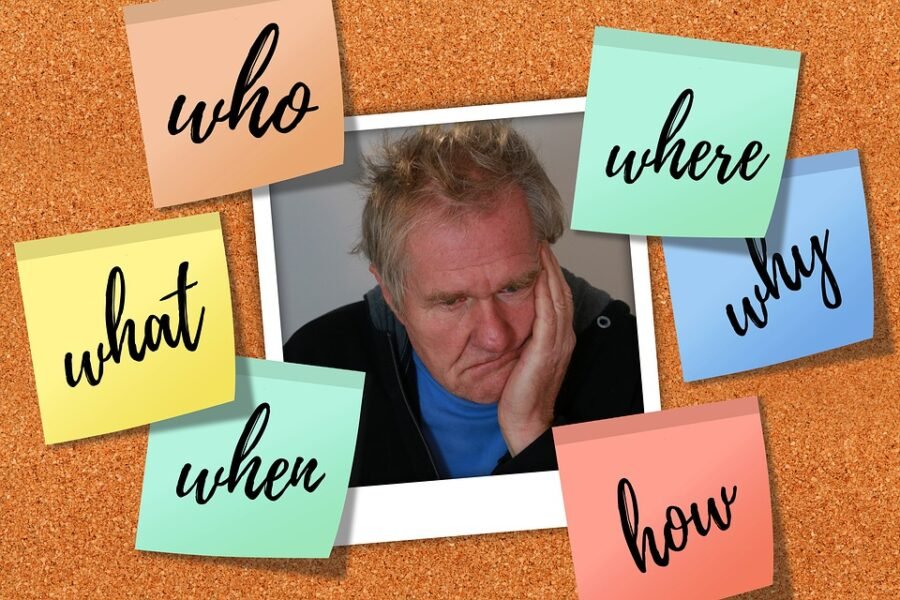
Understanding Dementia
“Unlocking the Mystery: Understanding Dementia and its Impact”. Dementia, a progressive neurological disorder, poses significant challenges for individuals and their families as cognitive functions gradually decline. Understanding dementia is crucial to provide the necessary support and care for those affected. Dementia encompasses a range of conditions, with Alzheimer’s disease being the most common form. It affects memory, thinking abilities, and behavior, often leading to difficulties in daily functioning.
The impact of dementia extends beyond the individual, affecting relationships, social interactions, and overall quality of life. By delving into the causes, symptoms, and stages of dementia, we can shed light on this complex condition and explore strategies for managing its effects. Education, early detection, compassionate care, and creating dementia-friendly environments are vital steps toward enhancing the lives of individuals living with dementia and fostering a more inclusive and understanding society.
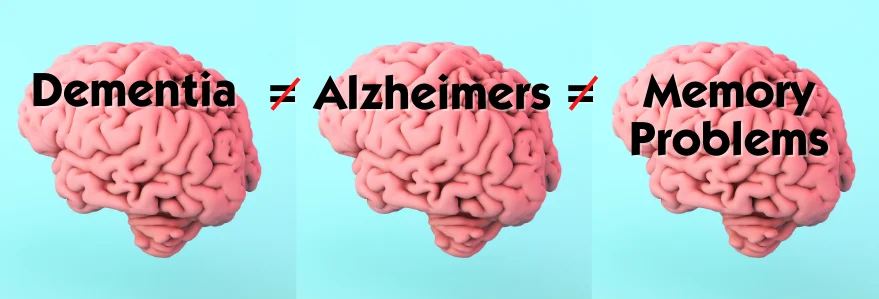
What is Dementia?
Dementia is a broad term that refers to a decline in cognitive abilities severe enough to interfere with daily life. It is characterized by memory loss, impaired thinking, problem-solving difficulties, and changes in behavior and emotions.
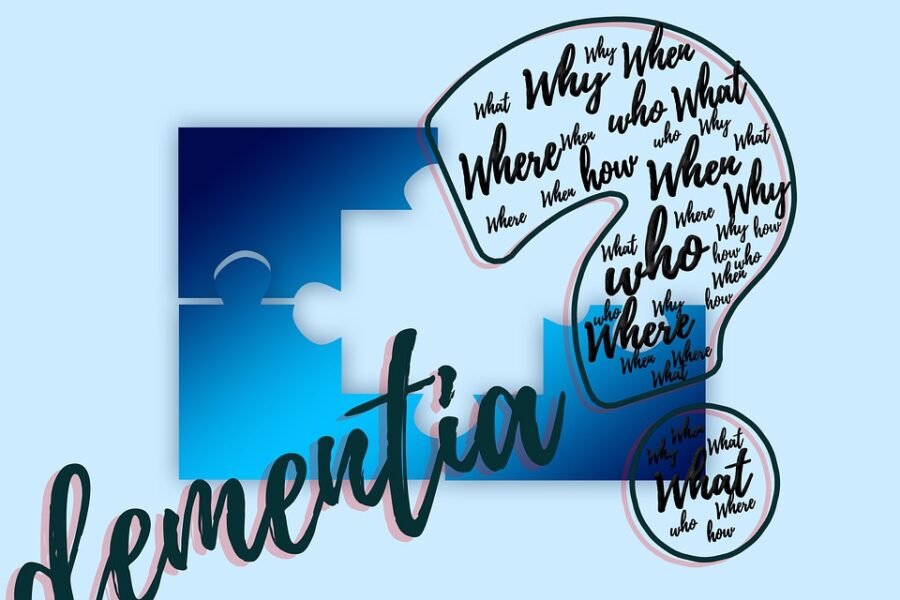
Types of Dementia
Dementia can result from various underlying causes, including Alzheimer’s disease, vascular dementia, Lewy body dementia, frontotemporal dementia, and others. Each type of dementia has unique features and affects different areas of the brain.
Unveiling Alzheimer’s Disease
“Unveiling the Enigma: Exploring Alzheimer’s Disease and Its Effects”
Alzheimer’s disease, a progressive neurodegenerative disorder, remains a perplexing enigma in the field of medicine. As one of the most prevalent forms of dementia, it gradually erodes memory, and thinking abilities, and eventually disrupts daily functioning.
Understanding the intricacies of Alzheimer’s disease is essential for both individuals diagnosed with the condition and their loved ones. The disease’s underlying mechanisms, such as the accumulation of amyloid plaques and tau tangles in the brain, contribute to the degeneration of neural connections.
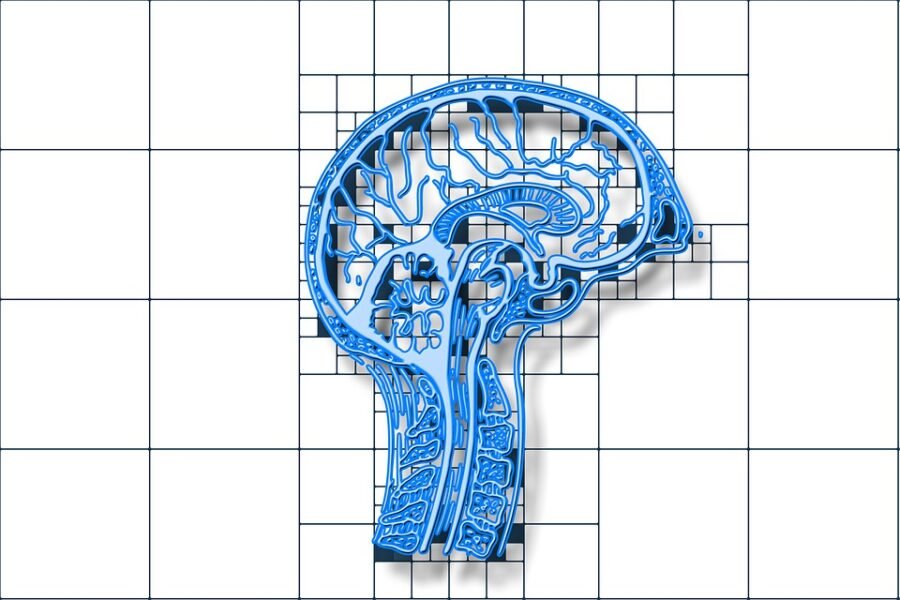
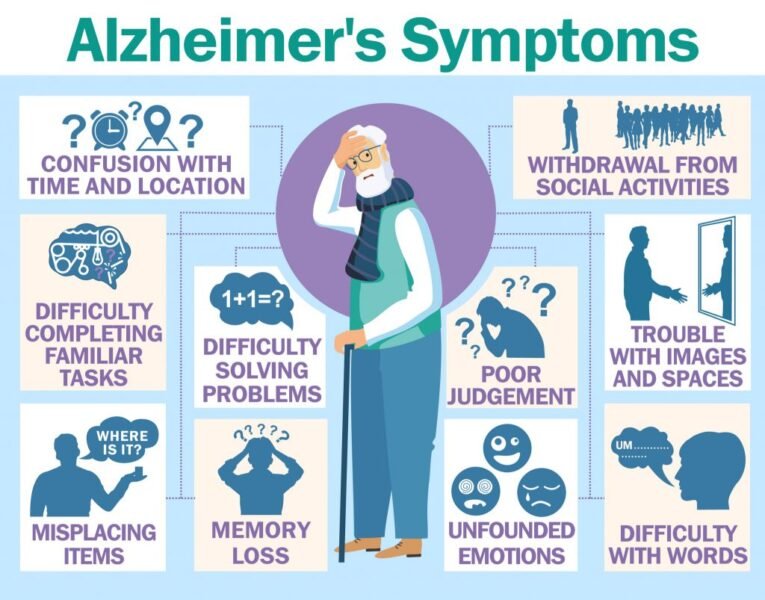
Exploring the risk factors, early signs, and stages of Alzheimer’s disease allows for timely interventions and better support. While there is currently no cure for Alzheimer’s, research advancements and therapeutic approaches offer hope for managing symptoms and improving the quality of life for affected individuals. By unveiling the mysteries surrounding Alzheimer’s disease, we can foster awareness, compassion, and dedication to finding effective treatments and, ultimately, a cure.
What is Alzheimer’s Disease?
Alzheimer’s disease is the most common form of dementia, accounting for approximately 60-80% of cases. It is a progressive brain disorder that affects memory, thinking, and behavior. Over time, Alzheimer’s leads to severe cognitive decline and interferes with daily functioning.
Causes and Risk Factors
The exact cause of Alzheimer’s disease is still not fully understood. However, age, family history, genetic factors (such as the presence of the APOE ε4 gene), and certain lifestyle factors, including cardiovascular health and education level, can contribute to the development of the disease.
Common Symptoms
Alzheimer’s disease typically starts with mild memory loss and progresses to more severe cognitive impairment. Individuals may experience confusion, disorientation, difficulty with language and communication, challenges in problem-solving, and changes in mood and behavior.
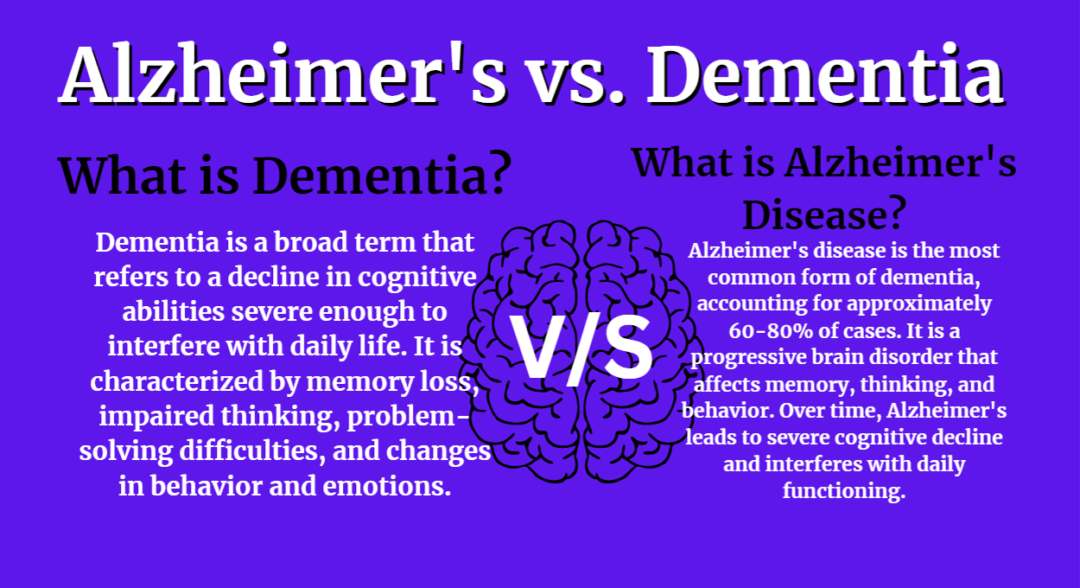
Differentiating Alzheimer’s and Dementia
“Decoding the Differences: Alzheimer’s Disease vs. Dementia”
Alzheimer’s disease and dementia are often used interchangeably, leading to confusion about their distinct characteristics. It is essential to understand the differences between these terms to gain a clearer perspective on these complex conditions. Dementia is an umbrella term that encompasses a group of symptoms affecting cognitive function, memory, and daily activities. It is caused by various underlying diseases and conditions, of which Alzheimer’s disease is the most prevalent form, accounting for approximately 60-80% of dementia cases.

While dementia is a broad term, Alzheimer’s disease specifically refers to a progressive neurodegenerative disorder characterized by specific brain changes. The primary hallmarks of Alzheimer’s are the accumulation of amyloid plaques and tau protein tangles in the brain, leading to the gradual impairment of memory, thinking abilities, and behavior.
Other forms of dementia, such as vascular dementia, frontotemporal dementia, and Lewy body dementia, have distinct causes and manifestations. Vascular dementia results from reduced blood flow to the brain, frontotemporal dementia primarily affects behavior and language, and Lewy body dementia involves abnormal protein deposits in the brain.
Understanding the differences between Alzheimer’s disease and dementia is crucial for accurate diagnosis, appropriate treatment strategies, and tailored support. While Alzheimer’s is a specific form of dementia, recognizing the various types of dementia allows for targeted interventions and better management of symptoms, ultimately improving the quality of life for individuals and their families affected by these conditions.
Alzheimer’s vs. Dementia
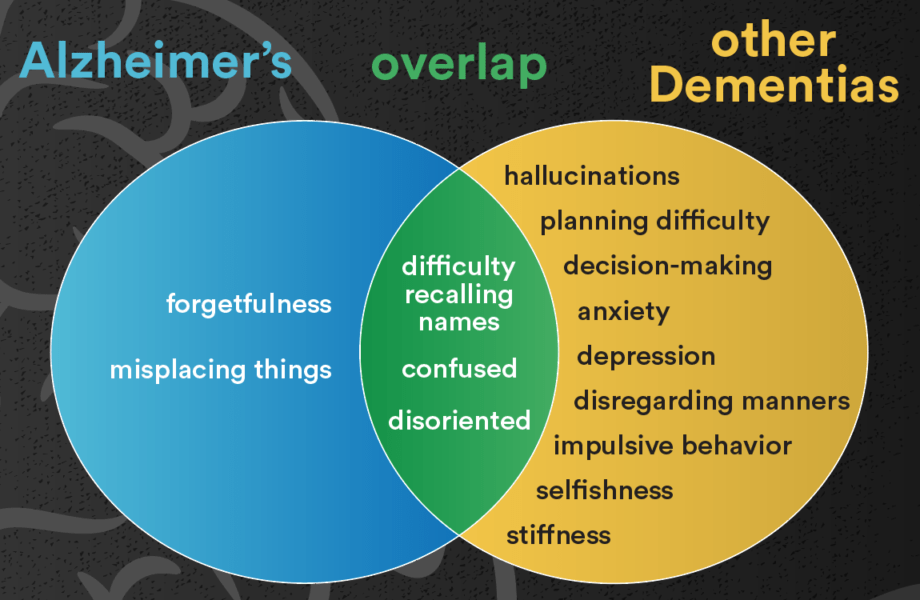
Relationship between Alzheimer’s and Dementia
Alzheimer’s disease is a specific type of dementia. In other words, all individuals with Alzheimer’s have dementia, but not all individuals with dementia have Alzheimer’s. Dementia is an umbrella term encompassing various conditions that cause cognitive decline.
Symptoms and Progression
While both Alzheimer’s and other types of dementia involve cognitive impairment, Alzheimer’s disease often exhibits distinct patterns of memory loss and cognitive decline. However, a comprehensive medical evaluation is necessary to differentiate between different types of dementia accurately.

Impact on Individuals and Caregivers
“Bearing the Weight: The Impact of Alzheimer’s Disease and Dementia on Individuals and Caregivers”
Alzheimer’s disease and dementia not only affect individuals diagnosed with these conditions but also have a profound impact on their caregivers. The cognitive decline, memory loss, and behavioral changes associated with these diseases create unique challenges and demands for both parties involved.
For individuals facing Alzheimer’s or dementia, the impact can be devastating. They may experience confusion, frustration, and a sense of loss as their cognitive abilities deteriorate. Everyday tasks become increasingly difficult, leading to a loss of independence and a shift in their sense of identity. Emotional distress and social isolation are common, as individuals struggle to communicate and maintain relationships. Coping with the progression of the disease can be emotionally taxing, causing anxiety, depression, and a sense of helplessness.
Caregivers, often family members or close friends, face their own set of challenges. The responsibilities of providing physical care, managing medications, and ensuring safety become increasingly demanding as the disease progresses. Emotional strain, exhaustion, and feelings of guilt or grief are common among caregivers. Balancing caregiving duties with personal and professional responsibilities can lead to increased stress and burnout.

Recognizing the impact on individuals and caregivers is crucial for implementing effective support systems. Providing education, resources, and respite care for caregivers can alleviate some of the burdens they face. Empowering individuals with dementia through person-centered care approaches and creating supportive environments can enhance their quality of life. Support groups and counseling services can offer emotional and practical assistance for both individuals and caregivers, fostering a sense of community and understanding.
By acknowledging the profound impact of Alzheimer’s disease and dementia on individuals and caregivers, we can work towards developing comprehensive care approaches, promoting empathy, and improving the overall well-being of those affected by these challenging conditions.
Emotional and Psychological Impact
Receiving a diagnosis of Alzheimer’s or dementia can be devastating for individuals and their families. Coping with memory loss, changes in behavior, and a decline in independence can lead to feelings of frustration, sadness, and anxiety. Emotional support and counseling are essential for managing these challenges.
Caregiving Challenges
Caring for individuals with Alzheimer’s or dementia can be physically and emotionally demanding. Caregivers often face significant stress, exhaustion, and financial burdens. Accessing support groups, respite care, and professional assistance can alleviate some of the challenges associated with caregiving.
Seeking Diagnosis and Treatment
“A Journey to Diagnosis and Treatment: Navigating Alzheimer’s Disease and Dementia”
Seeking an accurate diagnosis and appropriate treatment is a critical step for individuals experiencing symptoms of Alzheimer’s disease or dementia. The journey can be complex and multifaceted, but it is essential for managing the condition effectively and enhancing the quality of life for those affected.
Recognizing the early signs of cognitive decline and memory loss is key to prompt intervention. If you or a loved one suspects Alzheimer’s or dementia, seeking a comprehensive medical evaluation from a healthcare professional specializing in neurology or geriatrics is crucial. This evaluation may involve a series of assessments, including cognitive tests, medical history reviews, imaging scans, and laboratory tests, to rule out other possible causes of the symptoms.
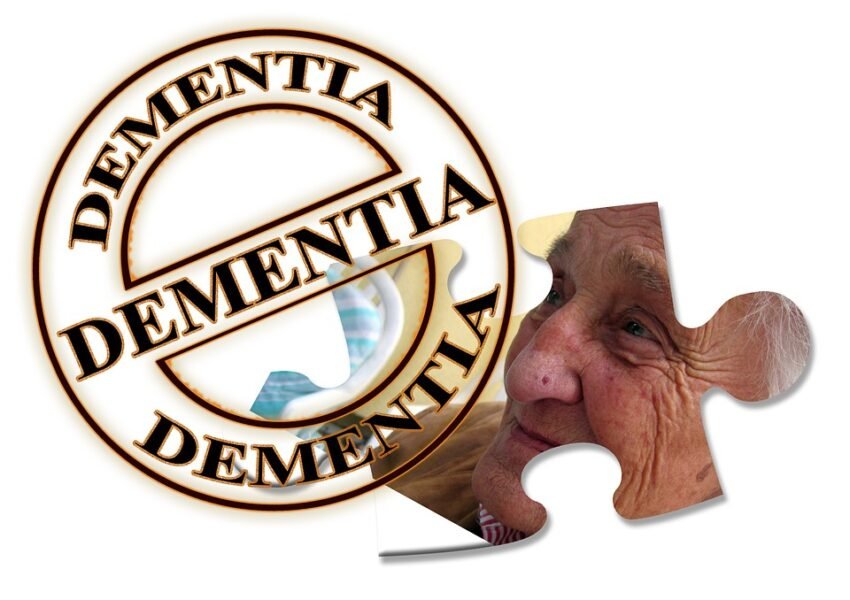
Once a diagnosis is established, developing an individualized treatment plan becomes paramount. While there is no cure for Alzheimer’s or dementia, various interventions can help manage symptoms and slow disease progression. Medications, such as cholinesterase inhibitors and memantine, may be prescribed to improve cognitive function and manage behavioral changes. Non-pharmacological approaches, such as cognitive stimulation, physical exercise, and social engagement, play a crucial role in maintaining cognitive abilities and enhancing overall well-being.
It is also essential to create a supportive environment that accommodates the needs of individuals with Alzheimer’s or dementia. Modifying the living space to enhance safety, establishing routines, and implementing memory aids can contribute to a more manageable daily life.
Caregivers and family members should seek support and education to navigate the challenges associated with Alzheimer’s or dementia. Joining support groups, seeking respite care, and accessing caregiver resources can provide valuable assistance and alleviate the emotional and physical strain.
Throughout the journey of diagnosis and treatment, it is important to maintain open communication with healthcare professionals, ask questions, and stay informed about new research and advancements. Collaborating with a multidisciplinary team, including physicians, therapists, and social workers, can ensure comprehensive care and support for individuals and their caregivers.
By actively seeking a diagnosis, developing personalized treatment plans, and accessing support, individuals and their loved ones can navigate the path of Alzheimer’s disease and dementia with a greater sense of understanding and empowerment.
Early Detection and Diagnosis
Early detection of cognitive decline is crucial for appropriate management and treatment. If you or a loved one are experiencing memory problems or other cognitive symptoms, seeking medical evaluation and assessment by healthcare professionals is important. A comprehensive evaluation may involve cognitive tests, medical history review, physical examination, and imaging tests to determine the cause and type of dementia.
Treatment Options and Support
While there is no cure for Alzheimer’s disease or most forms of dementia, various treatment approaches can help manage symptoms, slow disease progression, and improve quality of life. Medications, cognitive stimulation therapy, lifestyle interventions, and supportive care are commonly employed strategies.
Supportive Services
Individuals with Alzheimer’s or dementia and their caregivers can benefit from a range of supportive services. These may include caregiver education and training programs, respite care, in-home assistance, adult day centers, and support groups. It’s important to explore available resources in your community to access the support needed.
Conclusion
In conclusion, while Alzheimer’s disease is a specific type of dementia, dementia itself encompasses a broader category of cognitive disorders. Alzheimer’s is the most prevalent form of dementia, characterized by progressive memory loss and cognitive decline. Understanding the differences between Alzheimer’s and dementia is crucial for accurate diagnosis, treatment planning, and providing appropriate support to individuals and their caregivers.
Although there is no cure for Alzheimer’s or most forms of dementia, early detection, comprehensive evaluation, and accessing supportive services can significantly improve the quality of life for those affected. Ongoing research and advancements in understanding these conditions offer hope for future interventions and treatments.
If you or someone you know is experiencing memory problems or cognitive decline, it’s important to seek medical advice for proper evaluation and guidance. Remember, you are not alone, and support is available for those navigating the challenges of Alzheimer’s and dementia.
FAQs (Frequently Asked Questions)
1. Can dementia be reversed or cured?
Currently, there is no cure for most forms of dementia, including Alzheimer’s disease. However, early detection and appropriate treatment can help manage symptoms and slow down the progression of the disease.
2. How long can a person live with Alzheimer’s disease?
The progression and duration of Alzheimer’s disease can vary from person to person. On average, individuals may live with the disease for 8 to 10 years after the initial diagnosis, although some may live for a shorter or longer period.
3. Are there any lifestyle changes that can reduce the risk of developing dementia?
Adopting a healthy lifestyle that includes regular physical exercise, a balanced diet, social engagement, mentally stimulating activities, and managing cardiovascular risk factors (such as high blood pressure and diabetes) may help reduce the risk of developing dementia.
4. What is the difference between mild cognitive impairment (MCI) and dementia?
Mild cognitive impairment (MCI) is a condition characterized by a mild cognitive decline that is greater than expected for a person’s age but does not interfere significantly with daily functioning. It is considered a precursor to dementia and may or may not progress to dementia over time.
5. Where can I find more information and support for Alzheimer’s and dementia?
For more information, resources, and support for Alzheimer’s and dementia, please visit optimalhealth. in
For more visit optimalhealth. at
https://alz-journals.onlinelibrary.wiley.com/doi/10.1002/alz.13016
https://www.healthline.com/health/alzheimers-dementia/difference-dementia-alzheimers

